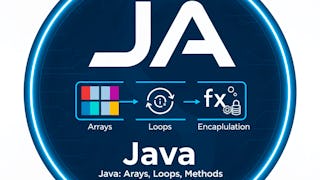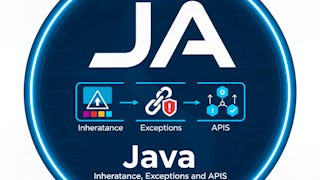Java: Data Types, Operators, and Decision Constructors is the first course of Exam Prep: Oracle Certified Associate, Java SE 8 [1Z0-808] Specialization. This course begins with Java fundamentals, guiding learners through class structures, variable scope, and the lifecycle of Java objects. The module also introduces the difference between primitive and reference data types, how to read and write object fields, and how to work with wrapper classes for data conversion and autoboxing. Through practical examples, students learn to evaluate expressions, test equality using == and .equals(), and build decision structures using if, if-else, ternary (?:), and switch statements.



Java: Data Types, Operators and Decision Constructors
This course is part of Exam Prep: Oracle Certified Associate, Java SE 8 [1Z0-808] Specialization

Instructor: Whizlabs Instructor
Access provided by BITS PILANI - Dubai Campus
Recommended experience
What you'll learn
Apply Java programming fundamentals by defining variables, constructing classes, and creating executable applications using the main() method.
Analyze control flow and decision-making in Java by implementing operators, loops, and conditional statements to solve logical problems.
Develop object-oriented programs by utilizing methods and encapsulation to produce efficient and maintainable code.
Skills you'll gain
Details to know

Add to your LinkedIn profile
6 assignments
November 2025
See how employees at top companies are mastering in-demand skills

Build your subject-matter expertise
- Learn new concepts from industry experts
- Gain a foundational understanding of a subject or tool
- Develop job-relevant skills with hands-on projects
- Earn a shareable career certificate

There are 3 modules in this course
Welcome to Week 1. We will start by exploring how variables work in Java, including how to define their scope and manage data safely and efficiently. Next, we’ll dive into the structure of a Java class, understanding how its components, fields, methods, and access modifiers, come together to form a cohesive program. You’ll then learn how to write and execute your first Java application using the main() method, the entry point for all standalone Java programs. We’ll also cover how to import other Java packages to extend functionality and make your code more modular and maintainable. By the end of this module, you’ll be confident in writing simple, executable Java programs, organizing code effectively into classes, and leveraging Java’s core language features to build well-structured applications.
What's included
6 videos2 readings2 assignments
Welcome to Week 2. This week, we’ll explore how Java manages data and objects. We’ll begin by learning how to declare and initialize variables, understanding how memory is allocated and how different data types behave. You’ll then differentiate between primitive types and object references, gaining insight into how Java handles data storage, manipulation, and assignment. Next, we’ll move into the world of object-oriented programming, where you’ll learn to access and modify object fields and examine the object lifecycle, from creation to garbage collection. You’ll also develop code that uses wrapper classes, bridging primitive data with Java’s object features to support collections and utility operations. By the end of this module, you’ll be able to confidently define, manipulate, and manage data in Java programs while applying best practices in object-oriented design and variable management, setting a strong foundation for advanced topics in Java programming.
What's included
5 videos1 reading2 assignments
Welcome to Week 3 on Java’s core decision-making and operational constructs. This week, you’ll explore how Java handles expressions, operator precedence, and logical evaluation to form the foundation of program control flow. You’ll start by learning how to correctly apply Java operators and use parentheses to override default operator precedence for predictable outcomes. Next, we’ll focus on decision constructs, writing conditional logic using if, if/else, and ternary expressions to handle complex branching in your code. You’ll also gain hands-on experience creating switch statements for more efficient multi-case decision control. Finally, you’ll wrap up by comparing and contrasting the key features and components of the Java language, reinforcing your understanding of how these constructs interact within a Java program. By the end of this module, you’ll be able to design clear, efficient, and logically sound Java programs that make precise decisions based on dynamic conditions.
What's included
4 videos2 readings2 assignments1 discussion prompt
Earn a career certificate
Add this credential to your LinkedIn profile, resume, or CV. Share it on social media and in your performance review.
Instructor

Offered by
Why people choose Coursera for their career







